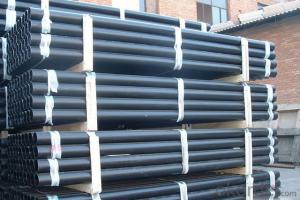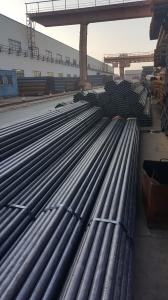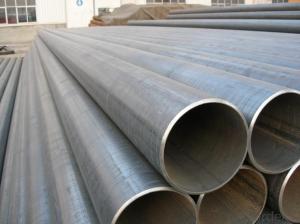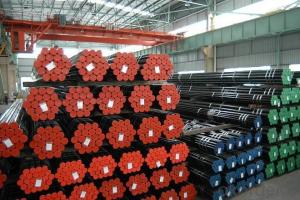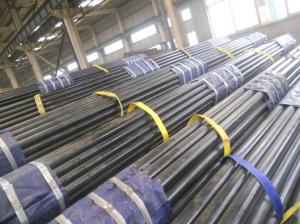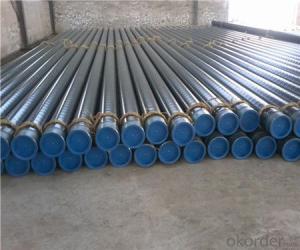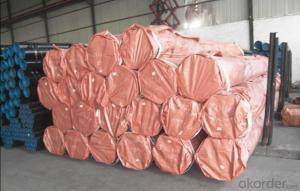API 5L GR.B Seamless Steel Pipe Best Seller Product
- Loading Port:
- Tianjin
- Payment Terms:
- TT or LC
- Min Order Qty:
- 25 m.t.
- Supply Capability:
- 10000 m.t./month
OKorder Service Pledge
OKorder Financial Service
You Might Also Like
1、Structure of API 5L GR.B Seamless Steel Pipe Best Seller Product:
Seamless pipe is formed by drawing a solid billet over a piercing rod to create the hollow shell. As the manufacturing process does not include any welding, seamless pipes are perceived to be stronger and more reliable. Historically seamless pipe was regarded as withstanding pressure better than other types, and was often more easily available than welded pipe.
2、Main Features of the API 5L GR.B Seamless Steel Pipe Best Seller Product:
• High manufacturing accuracy
• High strength
• Small inertia resistance
• Strong heat dissipation ability
• Good visual effect
• Reasonable price
3、API 5L GR.B Seamless Steel Pipe Best Seller Product Specification:
Standard | GB, DIN, ASTM ASTM A106-2006, ASTM A53-2007 |
Grade | 10#-45#, 16Mn 10#, 20#, 45#, 16Mn |
Thickness | 8 - 33 mm |
Section Shape | Round |
Outer Diameter | 133 - 219 mm |
Place of Origin | Shandong, China (Mainland) |
Secondary Or Not | Non-secondary |
Application | Hydraulic Pipe |
Technique | Cold Drawn |
Certification | API |
Surface Treatment | factory state or painted black |
Special Pipe | API Pipe |
Alloy Or Not | Non-alloy |
Length | 5-12M |
Outer Diameter | 21.3-610mm |
Grade | 20#, 45#, Q345, API J55, API K55, API L80, API N80, API P110, A53B |
Standard | ASME, ASTM |
1) Material:20#(ASTM A 106/A53 GRB.API5LGRB,GB),45#,16Mn,10#.
2) Specification range:OD:21.3-610mm,WT:6-70mm,length:6-12m or according to the requirement of clients.
3) Excutive standards:GB,ASME API5L.ASTM A 106/A53,Despite of the above standards,we can also supply seamless steel pipe with standard of DIN,JIS,and so on,and also develop new products according to the requirements of our clients!
4) Surface:black lacquered,varnish coating or galvanized.
5) Ends:Beveled or square cut,plastic capped,painted.
6) Packing:bundles wrapped with strong steel strip,seaworthy packing.
4、Packaging & Delivery
Packaging Details: | seaworthy package,bundles wrapped with strong steel strip |
Delivery Detail: | 15-30days after received 30%TT |
5、FAQ of API 5L GR.B Seamless Steel Pipe Best Seller Product :
①How is the quality of your products?
Our products are manufactured strictly according to national and internaional standard, and we take a test
on every pipe before delivered out. If you want see our quality certifications and all kinds of testing report, please just ask us for it.
Guaranteed: If products’ quality don’t accord to discription as we give or the promise before you place order, we promise 100% refund.
②How about price?
Yes, we are factory and be able to give you lowest price below market one, and we have a policy that “ for saving time and absolutely honest business attitude, we quote as lowest as possible for any customer, and discount can be given according to quantity”,if you like bargain and factory price is not low enough as you think, just don’t waste your time.Please trust the quotation we would give you, it is professional one.
③Why should you chose us?
Chose happens because of quality, then price, We can give you both.Additionally, we can also offer professional products inquiry, products knowledge train(for agents), smooth goods delivery, exellent customer solution proposals.Our service formula: good quality+good price+good service=customer’s trust
SGS test is available, customer inspection before shipping is welcome, third party inspection is no problem.
6、Seamless Pipe ASTM A106/53 Images:
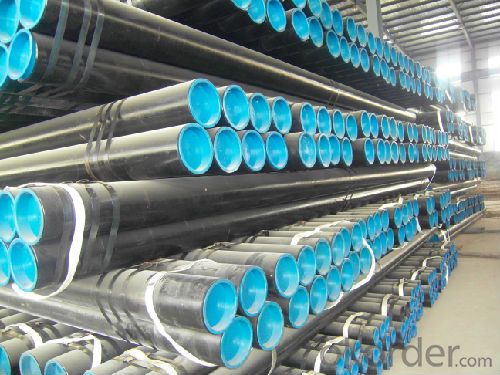
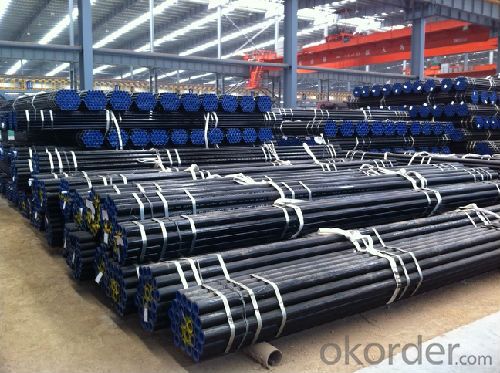
- Q: Are steel pipes suitable for wastewater treatment facilities?
- Yes, steel pipes are suitable for wastewater treatment facilities. Steel pipes are known for their durability, strength, and resistance to corrosion, making them ideal for handling the corrosive and harsh nature of wastewater. Additionally, steel pipes can withstand high pressure and temperature variations, ensuring the efficient and reliable transportation of wastewater within the facility.
- Q: Is steel pipe made of profiles?
- In accordance with the different smelting quality of steel, steel is divided into ordinary steel and high quality steel. According to the current catalogue of metal products, ordinary steel can be divided into large section steel, medium section steel and small section steel. The section steel can be divided into I-beam, channel steel, angle steel, round steel and so on according to its sectional shape.
- Q: How are steel pipes used in the construction of shipbuilding?
- Steel pipes are commonly used in shipbuilding for various purposes such as transporting fluids, supporting structures, and providing stability. They are used for the construction of the ship's hull, bulkheads, and compartments, as well as for the installation of water, fuel, and ventilation systems. Steel pipes are also utilized for the construction of masts, rigging, and other ship components that require strength and durability.
- Q: How are steel pipes used in the manufacturing of boilers and heat exchangers?
- Steel pipes are used in the manufacturing of boilers and heat exchangers primarily for their excellent strength, durability, and heat resistance properties. These pipes are used to carry hot fluids and gases, such as water and steam, throughout the boiler or heat exchanger system. The steel pipes provide a reliable and efficient means of transferring heat and maintaining the desired temperature within the system. Additionally, their corrosion resistance ensures long-lasting performance, making them an essential component in the manufacturing of boilers and heat exchangers.
- Q: How do you calculate the flow rate in a steel pipe?
- When calculating the flow rate in a steel pipe, several factors must be taken into consideration. The primary factor to consider is the cross-sectional area of the pipe, which can be determined using the formula A = πr², where A represents the cross-sectional area and r represents the radius of the pipe. Afterwards, it is necessary to ascertain the velocity of the fluid moving through the pipe. This can be accomplished by utilizing the equation v = Q/A, where v denotes the velocity, Q represents the volumetric flow rate, and A represents the cross-sectional area of the pipe. To determine the volumetric flow rate, one can employ the equation Q = AV, where Q represents the volumetric flow rate, A represents the cross-sectional area, and V represents the average velocity of the fluid. Furthermore, it is essential to take into account the properties of the fluid being transported through the pipe. Factors such as density and viscosity can impact the flow rate. In conclusion, the flow rate in a steel pipe can be calculated by determining the cross-sectional area of the pipe, calculating the velocity of the fluid, and considering the properties of the fluid being transported.
- Q: Can steel pipes be used for the construction of transmission towers?
- Yes, steel pipes can be used for the construction of transmission towers. Steel pipes are commonly used in the construction industry due to their strength, durability, and ability to withstand heavy loads. They provide structural support and stability required for transmission towers, making them a suitable choice for this application.
- Q: Are steel pipes magnetic?
- Yes, steel pipes can be magnetic. Steel, which is primarily composed of iron, is a ferromagnetic material. This means that it can be magnetized or attracted to magnets. However, not all steel pipes are magnetic as the magnetic properties of steel can vary depending on the specific composition and production methods used. In some cases, steel can be made non-magnetic by adding certain alloying elements or by subjecting it to specific heat treatments. Additionally, the strength of the magnetic field that steel pipes can exhibit can vary depending on factors such as the thickness of the pipe and the strength of the magnet being used.
- Q: Can steel pipes be used for water treatment plants?
- Yes, steel pipes can be used for water treatment plants. Steel pipes are commonly used for conveying water in various industries, including water treatment plants, due to their durability, strength, and resistance to corrosion. Additionally, steel pipes can withstand high-pressure water flows and can be easily welded, making them suitable for the demanding requirements of water treatment processes.
- Q: Do steel pipes require maintenance?
- Yes, steel pipes do require maintenance. While steel pipes are durable and long-lasting, they can still be subject to wear and tear over time. Regular maintenance is important to ensure their optimal performance and prolong their lifespan. One important aspect of maintenance is inspecting the pipes for any signs of damage or corrosion. Steel pipes can be vulnerable to rust and corrosion, especially in environments with high humidity or exposure to water. Regular inspections allow for early detection of any issues, which can prevent more significant damage and costly repairs in the future. Another aspect of maintenance is cleaning the pipes. Over time, steel pipes can accumulate debris, sediment, or mineral deposits. These build-ups can restrict the flow of fluids or affect the quality of the transported materials. Regular cleaning helps to remove these obstructions and maintain the efficiency of the pipes. Depending on the application, steel pipes may also require periodic lubrication or coating. This helps to reduce friction, prevent corrosion, and enhance the pipes' durability. Lubricants and coatings can be applied during maintenance to ensure the pipes continue to function smoothly and resist corrosion. Overall, regular maintenance of steel pipes is essential to maximize their performance, prevent damage, and prolong their lifespan. By investing time and effort in maintenance, potential issues can be identified and addressed early on, ultimately saving time and money in the long run.
- Q: Are steel pipes suitable for underground nuclear waste storage?
- Steel pipes are not suitable for underground nuclear waste storage. While steel is a strong and durable material, it is not resistant to corrosion when exposed to certain types of nuclear waste. Over time, the radioactive materials can corrode the steel pipes, leading to potential leaks and contaminating the surrounding environment. Additionally, steel pipes are not designed to withstand the extreme temperatures and pressures that can occur in nuclear waste storage facilities. Therefore, alternative materials such as corrosion-resistant alloys or concrete are typically used for underground nuclear waste storage to ensure the containment and isolation of the hazardous materials.
Send your message to us
API 5L GR.B Seamless Steel Pipe Best Seller Product
- Loading Port:
- Tianjin
- Payment Terms:
- TT or LC
- Min Order Qty:
- 25 m.t.
- Supply Capability:
- 10000 m.t./month
OKorder Service Pledge
OKorder Financial Service
Similar products
Hot products
Hot Searches
Related keywords
